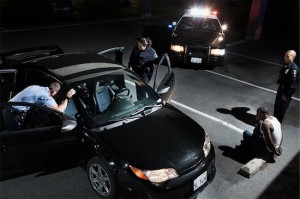
Jefferson County police were on pursuit of a man facing multiple felony charges, including child pornography and drug charges, when the suspect’s car crashed and flipped over.
The chase began in Bessemer and ended in Concord. Suspect Walter DeWayne McGowan and a female passenger were flung from the vehicle after driving over spike strips that Jefferson County deputies placed on Lock 17 road.
Birmingham Police Chief A.C. Roper said Bessemer Police assisted the U.S. Marshal service apprehending the suspect. Both the driver and passenger were taken to a nearby hospital and none of their injuries are life-threatening.



